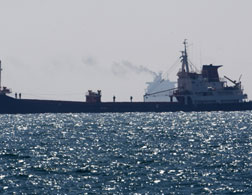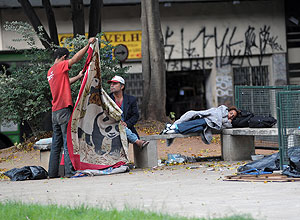by David Harris
JERUSALEM, June 1 (Xinhua) -- Everyone knew there would eventually be a point when the Israeli navy intercepts the pro- Palestinian, Gaza-bound flotilla but nobody predicted it would end in bloodshed and with thousands taking to the streets around the world to protest Israel's actions.
In the event over ten people were killed and many more injured as Israeli commandoes and protesters on board one of the boats in the flotilla clashed.
The jury is still out as to what actually happened and the truth may never be known, but behind the story that was splashed across the international media like no other on Monday is a much deeper issue -- the standoff between Israel and the Palestinian Islamic resistance movement Hamas.
Hamas accuses the "Zionist occupation forces" of trying to starve to death the people of Gaza, while Israel says its stranglehold on the Palestinian coastal enclave is in place in order to prevent Hamas from carrying out "terrorist activities."
Analysts in the region have different opinions over whom to blame in the incident, but they shared view that a reconciliation between Hamas and Fatah will help end the siege, preventing future violence.
ISRAEL'S ROLE IN GAZA
While the other Palestinian territory, the West Bank, is a large area of rolling hills, with space between cities and a natural water supply from the mountain aquifer, Gaza is a blighted, largely barren narrow strip of land squeezed between Israel and Egypt, two of the strongest nations in the Middle East.
There is high unemployment with few chances for success in the densely-populated Gaza, which abuts the Mediterranean Sea. Since 1967 it has been under Israeli occupation and the popular belief is that neither Israel nor Egypt want to have anything to do with Gaza.
In 2005, then Israeli Prime Minister Ariel Sharon ordered Israeli troops to evacuate all Israelis from the strip -- that meant the considerable military force and some 7,000 Jewish residents. At that point Israel said it had ended its presence in Gaza.
However, major international aid agencies argued that Gaza was still effectively under occupation because very few of its residents were permitted to leave and little in the way of goods was allowed into the strip.
Israel enforced a stricter siege on Gaza when Hamas took control of the strip and ousted the more moderate Fatah. The leader of Fatah Palestinian President Mahmoud Abbas referred to Hamas' action in 2007 as "a bloody coup."
Throughout the last decade, Hamas fired thousands of rockets towards Israel. In December 2008, Israel said it had taken all that it could and launched a three-week operation that left hundreds of Gazans dead, many of them civilians.
This week's flotilla was an attempt by pro-Palestinians to say to the Israeli government "no matter what you may think of Hamas' policies, your siege on Gaza is causing a humanitarian disaster."
Israel dismisses that argument, saying 15,000 tons of aid reach Gaza from Israel every week and the notion of a humanitarian disaster is out of all proportion when compared to the facts on the ground.
Israel says the flotilla was merely a "provocation," accusing its organizers of being supporters of terrorist organizations.
WHO IS TO BLAME?
From the perspective of Gazans, it is clear that Israel is at fault. Were it not for the siege there would have been no need for the flotilla and the bloodshed.
Naji Shurab, a professor of political science at Al-Azhar University in Gaza took a pragmatic approach.
"It's not a full siege but a partial siege. There are many goods in the markets," he told Xinhua on Tuesday. It is the building materials that fail to get through the Israeli security checkpoints, he explained.
What bothered him more is what he termed "the political siege."
"The meaning of life is more than food. I want to be able to go from one place to another. I want to be able to receive my treatments outside freely. I want to be able to take my children abroad freely," he said.
Shurab also pointed out that Israel is not alone in blockading Gaza, but that the Egyptians have imposed a similar regime at their frontier crossing with the Palestinian territory.
All Jewish Israelis, even the most dovish, agree that Hamas has to take at least some of the blame, while the overwhelming view in Israel is that Hamas is a terrorist organization that will never recognize the Jewish state.
It is that type of belief that has driven all Israeli governments to treat Hamas since its creation as a terror group and not as a legitimate government.
Therefore, Israel is under no international legal obligation to cooperate with the Islamic group, said Dan Diker, the director of the Institute for Contemporary Affairs at the Jerusalem Center for Public Affairs.
SO WHAT CAN BE DONE?
As a result of Monday's maritime incident, Israel is facing international condemnation and the Gazans are no better off.
Analysts warn that Turkey will not improve its ties with Israel until the core problems are addressed and in principle, which means ending the Israeli grip on Gaza.
For most experts here, the standoff between Israel and Hamas appears to be a lost cause but both Shurab and Diker have suggestions for what can be done to ease the situation for the people of Gaza.
Shurab believed Israel should lift the blockade and Diker stressed Hamas need a change, but both saw that their own side can play a role, too.
Shurab said a change in the nature of the leadership in Gaza would help persuade Israel to lift its partial siege, as he called it.
Hamas must end its ongoing intra-Palestinian rift with Fatah, he argued, suggesting that elections should be allowed to take place.
"If Hamas is then in government it will be responsible for lifting the blockade on Gaza by responding positively to the international community in accepting the previous agreements signed by the Palestinian National Authority and the Palestinian Liberation Organization," he said.
Meanwhile, there are reports that a further two boats are heading for Gaza and Israel will be judged on its actions in dealing with them. Israel will try at all costs to avoid further bloodshed given the beating it has taken in the media this week, but it continues to insist it will not allow its marine blockade to be broken.
As a result, Hamas maintained that Israel is guilty of state terrorism and there are signs that the region may once again plunge back towards violence, which will only succeed in adding to the misery of civilians on both sides of the border but in particular, the residents of Gaza.
![Validate my Atom 1.0 feed [Valid Atom 1.0]](valid-atom.png)






















































 Incêndio atinge favela na Zona Sul de São Paulo (Foto: Reprodução/TV Globo)
Incêndio atinge favela na Zona Sul de São Paulo (Foto: Reprodução/TV Globo)














 Ciro Gomes (PSB-CE/SP) está de volta. Excluído do tabuleiro presidencial, ele havia tomado chá de sumiço em 29 de abril.
Ciro Gomes (PSB-CE/SP) está de volta. Excluído do tabuleiro presidencial, ele havia tomado chá de sumiço em 29 de abril.
